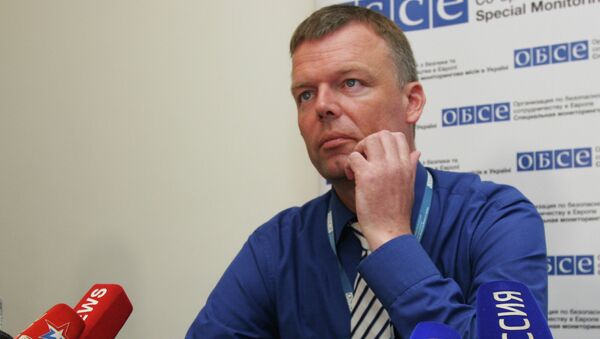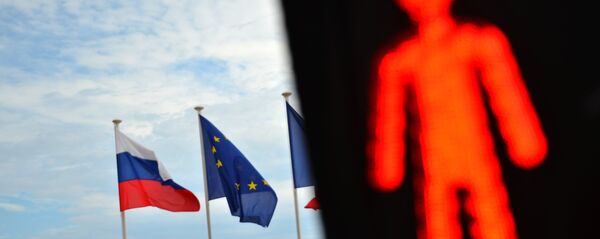"The SMM has nothing to do with the sanction politics, that is not our mandate. Our mandate is to report on the situation in Ukraine and it is not involved in any form or shape in the decision making on sanctions," Hug said.
Following the escalation of the conflict in eastern Ukraine in late January-early February, Hug visited Brussels to discuss with the OSCE states the situation and to express concern over the threat of the resumption of violence.
The SMM deputy chief stressed that the data he presented to the OSCE states at the Brussels meeting related only to the situation on the ground.
"It was purely related to the situation in the East, our findings and the measures that are needed now on the ground to bring about stabilisation to the ongoing conflict, of course in the view of the most recent flare up that was in the end of January – beginning February," Hug said.
The situation in eastern Ukraine worsened at the end of January when the clashes between the Kiev forces and Donbas militia intensified in the towns of Avdiivka and Yasynuvata.
The EU-Russian relations deteriorated following disagreements over the crisis in Ukraine. The European Union, alongside the United States, imposed sanctions against Russia after a referendum in Crimea in 2014, in which a vast majority of its inhabitants decided to reunite with Russia. Western states have also accused Moscow of meddling in Ukraine’s internal affairs, while the Moscow has repeatedly denied the allegations.
The flare-up of violence in the Donbas region in eastern Ukraine is still possible, despite the lowered number of ceasefire violations, as several factors conducive to outbreak of violence remain, including heavy weaponry not being withdrawn, OSCE Special Monitoring Mission Principal Deputy Chief said.
"Now the situation on the ground remains unchanged in terms of the risk factors, though the ceasefire violations have gone down in numbers. The risk factors have not been addressed properly. The heavy weapons are still there, we see them every day, we hear them every day, and the positions that have been in close proximity have not been changed in any form or shape. So the risk of a renewed flare up is clearly there and cannot be excluded," Hug said.
According to the OSCE SMM deputy chief, the de-escalation requires heavy weapons to be removed "as agreed" from the contact line, forward moves have to be stopped and the distance between the sides has to be built.
Kiev launched a military operation against the self-proclaimed Donetsk People's Republic and neighboring Luhansk People’s Republic in 2014, when the two regions refused to recognize the new Ukrainian government.
In 2015, the two conflicting sides reached a ceasefire agreement in Minsk after the negotiations brokered by the presidents of Russia, Ukraine and France, as well as by the German chancellor. The Minsk accord includes withdrawal of heavy weaponry from the contact line in eastern Ukraine among other provisions.
The Organization for Security and Co-operation in Europe's Special Monitoring Mission to Ukraine is ready to provide a mechanism to verify the actions of the sides to the conflict but it needs information regarding weapons at the contact line from both Kiev and Donbas militia, Alexander Hug told Sputnik.
"We would need to get a list, for instance, of weapons, weapons that are at the moment at the contact line and would need to be removed beyond the withdrawal line. Then we can document it, yes, the weapon was there, but now it is here, behind the line in a shelter and remains there," Hug said.
He pointed out that de-escalation in eastern Ukraine could be achieved only in case of cooperation between the sides to the conflict.
"We are willing and ready to provide this verification, but for that we need the cooperation of the sides. And the Ambassador Apakan, Chief Monitor, has written to the sides to demand this data multiple times in the past, last time on the 3rd of February. We have received some information from the sides, but it relates to weapon already withdrawn," Hug added.
According to Hug, the SMM has already received some information on withdrawn weapons from Kiev troops and Donbas militia, and the OSCE mission praised their efforts, however, there still are weapons in the security zone that actually should not be there.
On Wednesday, Russia's envoy to the Contact Group on Ukraine Boris Gryzlov said that the pullout of heavy armaments from the contact line in Donbas was scheduled for March 7.
In 2014, Kiev launched a military operation against the self-proclaimed republics of Donetsk and Luhansk, when they refused to recognize the new Ukrainian government that came to power after what they perceive to be a coup. In February 2015, the representatives of both Kiev and Donbas militia gathered in the Belarusian capital of Minsk and signed a ceasefire deal brokered by the leaders of France, Germany, Russia and Ukraine. The agreement included a number of provisions, weapons withdrawal from the contact line among them. Both sides to the conflict, however, have been accusing each other of violating the agreement. The recent escalation in eastern Ukraine took place late in January.
The OSCE SMM to Ukraine was deployed on March 21, 2014.
Long-term prognosis for a situation in the Donbas region in eastern Ukraine would be difficult to give, monitors from the Organization for Security and Co-operation in Europe's (OSCE) Special Monitoring Mission (SMM) to Ukraine asses the situation every day, the mission's Principal Deputy Chief Monitor said.
"The situation in [Donbas] is very fluid, it changes every day and every day our monitors make a new assessment on the ground and these new assessments are available in our reports. So this is a steady and continuing security assessment and it would be not professional if I would say, well, my assessment will expire in a week's time, because this changes on a very regular basis and we every day multiple times reassess the situation for our own purpose, because we need to be aware of what threats may be put towards our monitors as a result of certain situation on the ground," Hug said.
He added that SMM reports were a good indicator of the situation on the ground.
"If we establish the fact that there is amassing of forces in one or in other location we would identify it and would report about it," the deputy chief monitor said.
The conflict between Kiev and the two self-proclaimed republics in Donbas intensified in January, with both sides accusing each other of stepping up shelling and attempts to advance on the contact line near Donetsk.
The two sides have been locked in a confclit since 2014 when Kiev launched a military campaign against the self-proclaimed Donetsk People's Republic and neighboring Luhansk People’s Republic, as the two regions refused to recognize the new Ukrainian government.
Never miss a story again — sign up to our Telegram channel and we'll keep you up to speed!



